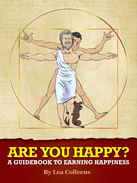
 |
Colleens’ brief guide uses formulas, pros and cons, and cycle diagrams to demonstrate that we do not find happiness; rather, we earn it by controlling our mind/ego. Humans have a three-part brain, each assigned to govern our mental, emotional, and physical responses to life. Relationships are the ideal place for these three brains to clash. While the Reptile Brain demands immediate satisfaction based on ego and sex drive, the smaller Dog Brain will go along unless trained appropriately by the larger, more-reserved Master Brain. Relationships are the perfect place for these three brains to clash.
The author helpfully offers steps to follow for those who find it difficult to wisely choose their associations. Readers will learn the difference between affection and attention. They will practice a technique called Wandering to bypass the impulsive Reptile Brain and gain time to discern admirable qualities in others. It is by becoming acquainted that people can identify what they really seek in a companion. This slower technique also proves that one is worthy of trust—the final step to earning affection.
While the graphics indicate the book is targeting those active in the dating community, the author’s use of strong language in a guidebook of this nature runs the risk of not appealing to a wider audience. Extensive mind research has recently come out of Australia—the authors’ homeland—and Colleens has deftly taken the science governing how the brain works and successfully applied it to her keys for Earning Happiness, strategies she personally discovered and developed. Her reason for publishing is because everyone looks for personal happiness, but even those successful at finding it cannot always tell another how to proceed. The book’s layout alternates between extremely helpful steps, comparison charts, and cycle diagrams contrasted with sections of dialogue that cross the line between self-help and pep talk.